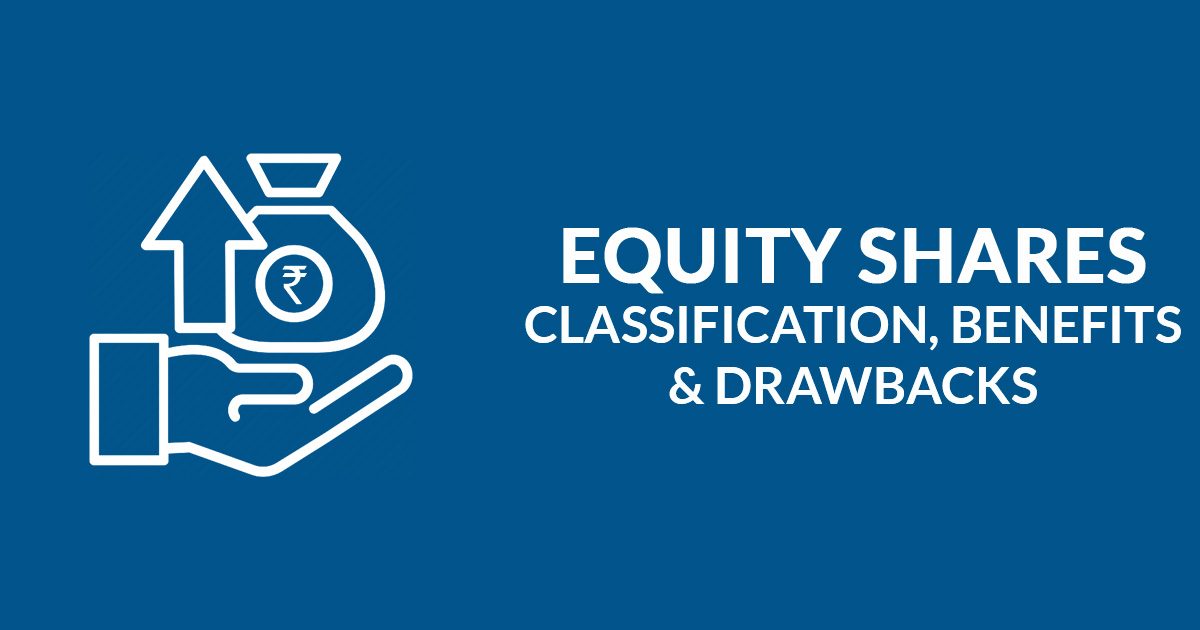Equity share is a major source of finance for any company which provides the rights to vote in the meeting of the holder of the company and shares profits and claims on assets to the investors.
Also known as ordinary shares, it symbolises partial ownership of a shareholder in which he takes the maximum entrepreneurial risk related to business venture on its shoulder. The holders of such shares are the real owners of the company and have voting rights and control over the working of the company.
Equity shareholders get dividend after it is paid to the preference shareholders. The proportion of dividend these shares are eligible to get relies upon the amount of profits of the company. They may get a higher rate of dividend or they may not get anything.
Equity shareholders deal with greater risk than the preference shareholders because equity capital is paid after paying all the claims to the preference shareholders and to others. They undertake risk in both ways regarding dividend and return of capital as well.
For an investor, these shares are an attestation of their ownership in the company which entitle them to get a share from the net profits and a residual claim over the assets of the company in the event of a liquidation. The liability of the shareholder towards the company limits the amount of issue price of the equity stock.
Top Features of Equity Shares:
No Maturity Period
Equity share capital is irredeemable in nature and it remains permanently with the company. It is given back to the shareholders only when the company is terminated.
Voting Right
Equity shareholders have voting rights in the meetings of the company.
Rate of Dividend
There is no fixed rate of dividend for equity shareholders, rather it depends upon the availability of surplus funds.
Right to Control
Equity shareholders have the authority to elect and control the management of the company and to take the decisions about the operations of the business.
Also Read: Preference Shares and Its Different Types?
Classification of Equity shares:
Equity shares are classified on the basis of different factors. Different kinds of equity share capital are authorized, issued, subscribed, paid up, rights, bonus, sweat equity etc.
1.) Authorized Share Capital
Authorized share capital is the maximum number of stock units (shares) that a company can issue as mentioned in its memorandum of association or its articles of incorporation. The companies can do some additions in it from time to time after completing some formalities of paying fees to the legal bodies.
2.) Issued Share Capital
It is the part of authorized capital which the company offers to the investors at the nominal value of the share.
3.) Subscribed Share Capital
It is the part of issued capital which is held by the shareholder (an investor accepts and agrees upon)
4.) Paid Up Capital
It is the part of the subscribed capital, which has been fully paid by the investors or the money which a company actually invests in the business.
In general, all companies accept the complete payment of shares in a single time by shareholders and so the issued, subscribed and paid capital becomes one and the same.
In short, it is the amount of money invested in the firm by the shareholders in exchange for the shares purchased by them.
Apart from These Four, The Other Types of Shares (Equity) are :
1.) Rights Shares
Right shares are the shares that are issued exclusively to the current shareholders by a company in proportion to the equity shares hold by them. The company issues such kind of shares with the motive to defend the ownership rights of the existing investors.
2.) Bonus Shares
Bonus shares are additional shares given to the current shareholders as bonus means without any additional cost, based upon the number of shares that a shareholder owns. They can be in the form of dividend or they can be accumulated earnings which are not offered in the form of dividends but are converted into free shares.
3.) Sweat Equity Share
Sweat equity shares are issued to exceptional employees or directors of the company in lieu of their extraordinary efforts like providing know-how or intellectual property rights to the company for its development.
Advantages of Equity Shares:
- No Fixed Dividend: Equity shares do not bound the company with an obligation or compulsion to pay a fixed rate of dividend. If a company generates enough earnings, shareholders will be entitled to get dividend but there is no legal obligation to pay dividends.
- Right to Vote: Equity shareholders are the actual owners of the company with all the voting rights. This is the exclusive right for the equity shareholders.
- Charge over the Assets: Equity shares can be issued without creating any charge over the assets of the company.
- A permanent Source of Capital: Equity Shares is the life-long source of capital. The company need not pay the invested amount back to the shareholders except in the event of a liquidation.
- Permanent Sources of Finance: Equity share capital is the long-term permanent source of finance and so can be utilized for the long-term or fixed capital requirement of the company.
- Retained Earnings: When a company has the extra share capital, the retained earnings will get the benefit which is the cheaper sources of finance, as and when compared to other sources of finance.
- Actual Gainer: When the company earns the profits, the equity shareholder becomes actual earners of profit in the form of increased dividends and appreciation in the value of shares.
- Less Capital Cost: Cost of capital is one of the important factors which leads to a greater difference in the value of the company. When the company is willing to increase its value, they can use more share capital which has a lower cost of capital in comparison to the other source of finance.
Disadvantages of Equity Shares:
- Trading on equity, not allowed: When the company increases its capital only with the support of equity, the company cannot bear fruits of trading on equity.
- Hurdles in Management: Equity shareholders can put obstacles for management by manipulating and organising themselves.
- Irredeemable: Equity shares are irredeemable during the lifespan of the business entity. Too risky, in the case of overcapitalization.
- Leads to Speculation: In the blooming situation when a higher amount of dividend has to be paid, results in the elevated value of shares in the market and this leads to the speculation.
- Fluctuating and Restricted Returns: Investors who want steady income may not prefer equity shares as equity shares get fluctuating returns and hence restricts investors who wish to invest in the safe securities with a stable income.
So, this is everything you need to know about equity shares in order to get started with the trading of equity shares. If you have any comment or suggestion regarding the article, feel free to write in the comment section.









